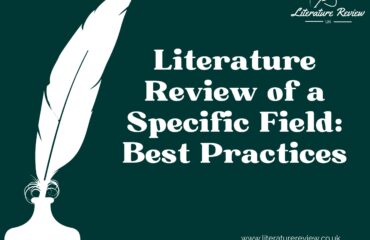
Unlocking Excellence: Your Guide to Transforming Dissertation Examples into Outstanding Literature Reviews
Are you a student embarking on the journey of crafting a dissertation literature review that leaves a lasting impression? Or perhaps you’re a seasoned researcher seeking to enhance your literature review skills. In this comprehensive guide, we’ll show you how to take existing dissertation examples and adapt them into unique, exceptional literature reviews that stand out in the academic landscape.
The Power of Dissertation Examples in Literature Reviews
Dissertation examples can be invaluable resources for understanding the intricacies of a well-structured literature review. They serve as templates, providing insights into the organization, depth, and critical analysis required for a successful literature review. However, the key lies in how you adapt and improve upon these examples to make them your own.
Deconstructing Excellence: Examples of Literature Review Dissertations
To appreciate the potential of transforming dissertation examples into outstanding literature reviews, let’s delve into a few examples:
Dissertation Example #1: “Exploring Sustainable Urban Development”
In this dissertation, the literature review section stands out for its clarity and focus. It introduces the research topic effectively, presents a clear research gap, and critically analyzes relevant sources. This example demonstrates how to structure and articulate a literature review cohesively.
Dissertation Example #2: “The Impact of Early Childhood Education on Cognitive Development”
This example shines by addressing a critical educational topic. The literature review presents an extensive overview of the existing research, effectively summarizing key studies, theories, and findings. It showcases how to synthesize findings from multiple sources seamlessly.
Dissertation Example #3: “Analyzing the Role of Artificial Intelligence in Business Innovation”
Artificial intelligence is a rapidly evolving field, and this dissertation example demonstrates adaptability. It keeps the literature review up-to-date with the latest research, incorporating emerging trends and perspectives. This highlights the importance of staying current in your field.
What Makes These Examples Stand Out?
Now, let’s deconstruct what makes these dissertation examples exceptional and how you can adapt and improve upon them:
- Clearly Defined Research Questions: Each example starts with precisely defined research questions, keeping the literature review focused and purposeful.
- Thematic Organization: The literature reviews are organized thematically, allowing for a logical presentation of ideas and the identification of key themes and trends.
- Critical Evaluation: These examples don’t merely summarize sources; they critically evaluate them. They highlight strengths, weaknesses, and gaps in the existing literature.
-
Synthesis of Findings: Successful literature reviews synthesize findings from various sources to create a holistic view of the topic. This synthesis helps build the case for the research’s significance.
Crafting Your Unique Literature Review
Now that you’ve seen what sets exemplary dissertation examples apart, it’s time to adapt and improve them to create your unique literature review. Here’s a step-by-step guide to get you started:
Step 1: Define Your Research Questions
Begin by clearly defining your research questions or objectives. These questions will guide your literature review and help you adapt the existing examples effectively.
Step 2: Select Relevant Dissertation Examples
Identify dissertation examples that closely align with your research topic or objectives. Look for examples that showcase effective structure and critical analysis.
Step 3: Analyze and Adapt
Thoroughly analyze the selected examples. Pay attention to their structure, how they introduce the research topic, and how they critically evaluate sources. Adapt these elements to fit your research questions.
Step 4: Add Your Unique Perspective
While adapting, don’t forget to infuse your unique perspective into the literature review. Highlight what makes your research approach distinctive and how it contributes to the existing body of knowledge.
Step 5: Citation and Referencing
Ensure that you cite and reference the adapted sections properly. Accurate citation is crucial to maintain academic integrity.
Step 6: Seek Feedback
Share your adapted literature review with peers, mentors, or advisors. Feedback can help refine your work and ensure it meets academic standards.
Step 7: Revise and Polish
Revise your literature review meticulously. Pay attention to clarity, coherence, and language use. Aim for a polished final product.
Professional Assistance for Your Adapted Literature Review
While adapting dissertation examples can be a valuable learning experience, sometimes, you may need professional assistance to ensure your literature review reaches its full potential. That’s where our Literature Review Help Services come into play.
How Our Services Can Elevate Your Literature Review:
-
Expert Guidance: Our team of experts offers guidance tailored to your research objectives, helping you adapt and improve your literature review effectively.
- Comprehensive Research: We excel in conducting extensive literature searches, identifying relevant sources, and critically evaluating them based on your research area.
- Customized Synthesis: We assist you in synthesizing findings from your sources to create a cohesive and persuasive literature review.
- Formatting Excellence: We ensure that your literature review adheres to the specific formatting guidelines of your institution, leaving no room for errors.
-
Timely Support: We understand the importance of meeting deadlines. Our team works diligently to provide timely assistance, helping you stay on track with your academic progress.
Conclusion: Elevate Your Literature Review to New Heights
Crafting a unique literature review is not just a requirement; it’s your opportunity to contribute significantly to your field of study. By adapting and improving dissertation examples, following a structured process, and seeking professional assistance when needed, you’re on the path to academic excellence and research impact.
Remember, your literature review reflects your commitment to research and your ability to engage with the scholarly conversation. With the right guidance and support, you can elevate your literature review to new heights, making a lasting impact in your field.
Ready to embark on the journey to excellence? Contact our Literature Review Help Services today and take the first step towards crafting a unique and outstanding literature review. Your academic and research success awaits.




